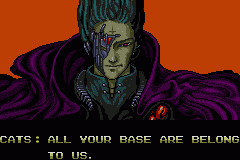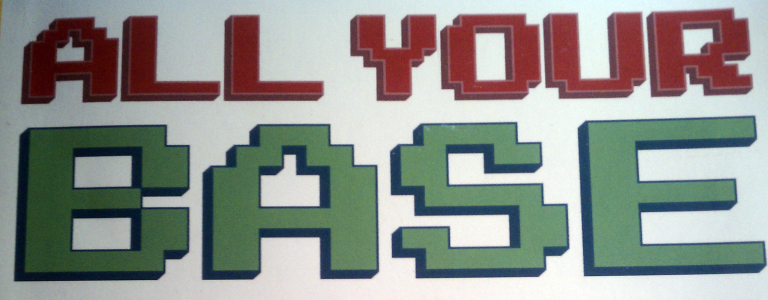“It wasn’t just a monster coming out of a primordial swamp with tentacles ready to grab, suck, and chomp. Bioshock didn’t just play with the eyes; it played with the mind, the dark crevices where you hide things away from your closest friend or relative.” (Goldberg, 205)
Hey all,

The book's title originates from an early internet meme, a bit of barely-English from the game Zero Wing.
I recently finished Harold Goldberg’s All Your Base Are Belong to Us: How Fifty Years of Videogames Conquered Pop Culture. The book was published this year by Three Rivers Press in New York, and aims to explore the recent rise of video games as the entertainment industry in the United States.
The structure of the book is simple: each chapter follows the narrative of a particular game designer (or perhaps two from the same company), and documents their rise from obscurity to popularity, with quotes from interviews to emphasize their perspectives on the industry. The reader will come across the stories of Alexey Pajitnov (of Tetris fame), Nolan Bushnell (of Atari infamy), Will Wright (anything with “Sim” in the title), Roberta Williams (Sierra On-Line), to name just a few.
These narratives are skillfully crafted and include just enough exposition to make them feel much less like reading a history textbook than a thorough newspaper article: the designers’ personalities come through loud and clear, whether it be arrogant, cutthroat, diplomatic, kind, brazen, or quietly genius. My only issue with the writing is that sometimes it attempted to be a bit too clever for me; the number of out-of-context references in a few areas leading me grasping for the author’s meaning. In addition, some of the chapters are weaker than others; the evolution of the industry makes the first chapters flow much more easily, with the latter chapters feeling more like one-offs than part of a coherent narrative.
The book does provide a clear view of the early life cycle of game companies: intelligent individuals band together and form a startup, make one hit and earn a ton of money, which they then spend frivolously, putting the company at risk. If they don’t go out of business, then it purchased by a larger corporation, which then influences (negatively) the creative control of the designer. The perils of game designers as financial officers is perfectly clear. In addition to this, another theme that permeates throughout the book is what success cost the designers and developers: often in the final pages of a chapter show the designers as unhappy and unhealthy, having sacrificed marriages, relationships with co-workers, and happiness to make the games that they love.
One thing I found strange about the book is that its title is never explained. In fact, I feel like the book is mis-titled, because the focus of the book is on the developers and their games, and while the title implies that the work looks at culture and how pervasive video games have become. Sure, there are mentions to the South Park episode about World of Warcraft and Crash Bandicoot action figures, but overall the book focuses on the rise of video games. The chapter titled “Bioshock: Art for Game’s Sake” focuses on the development of Bioshock and is easily my favorite chapter due to its insistence of the game as prime example of video games as works of art.
I wish that the author had focused a bit more on the impact of games on culture. As I mentioned above, there are a few references to games’ impact outside of games, but I was disappointed with the lack of depth there. The chapter on video game movies is woefully inadequate, and while I agree that most of them are absolutely atrocious, the author does not go into much depth as to why the games have not successfully translated to the big screen successfully.
Overall, I would recommend the book to anyone who wants to increase their game designer name dropping ability, or generally interested in history of the game industry. Do not view it as the end all of histories, but is a great read full of insight and colorful characters, to say the least.
Till next time,
S

Comments